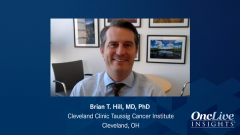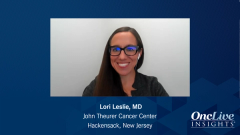
Unmet Needs and Future Directions in Care for Relapsed/Refractory FL
Closing out her discussion on novel therapy for relapsed/refractory follicular lymphoma, Lori Leslie, MD, highlights unmet needs and considers future evolutions in the treatment paradigm.
Episodes in this series

Transcript:
Lori Leslie, MD: A lot of questions remain in relapsed/refractory follicular lymphoma [FL]. We have a variety of treatment options that are quite different in their administration and mechanism of action, which all impact the immune system on a different way. The main question is what do we do about sequencing and patient selection? When using a longer-term therapy, can we use consolidative approaches or minimal residual disease to help personalize therapy and transform therapy from long term to time limited for patients who are in a deep response? How do we shift some of these nonchemotherapy options, both FDA available and coming soon, into the earlier-line settings?
There are ongoing studies looking at R2 [lenalidomide, rituximab] combinations in the frontline setting. There are studies looking at CAR [chimeric antigen receptor] T-cell therapy as early as the second-line setting. There are combination studies looking at tazemetostat with various other options in the second-line and beyond setting. And there are many other very encouraging treatment options, hopefully soon to be approved for FL, including the bispecific T-cell engagers. There are ongoing studies not only in the relapsed/refractory setting but also in combination, as early as the front line. In summary, we’re shifting away from the chemotherapy-for-all approach in frontline FL. As the relapsed/refractory treatment landscape becomes increasingly encouraging and crowded, all these agents are being combined and shifting toward earlier-line settings.
It’s very challenging to be an oncologist. It’s encouraging that we’ve got personalized therapy and targeted therapies, but things change quickly. It’s hard to stay up to date. Even in lymphoma, which is all I treat, it can be hard to stay up to date, given the rapidity at which new data and new treatment options are coming out. Even the NCCN [National Comprehensive Cancer Network] may change its guidelines for a certain disease several times in a single year. My advice is to check guidelines frequently. If you have a patient with FL, with a variety of treatment options, as early as the frontline setting, it’s helpful to phone a friend if you have questions about clinical trial opportunities, sequencing, or anything else to help the treatment of that specific patient.
Thank you to the audience. I hope you found this program informative.
Transcript edited for clarity.






































